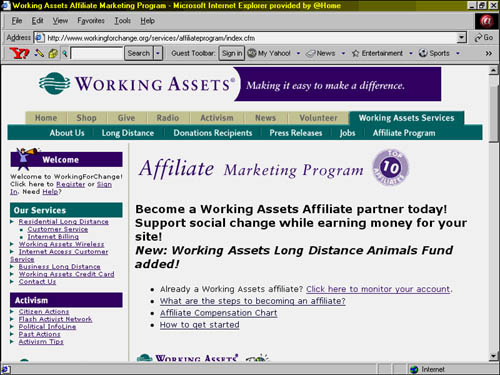Other Affiliate Marketing Uses
The pure merchant/affiliate sales model, where Web sites sign up for a merchant’s affiliate program and earn revenue for themselves, is not the only affiliate model on the Net. Over the last two years, several companies have figured out how to use the affiliate marketing concept in new ways.
One model is a new type of affiliate site that pays its visitors for buying a merchant’s products. Web sites such as Spree.com (www.spree.com) and ebates.com (www.ebates.com) (see Figure 2.3) do not provide a shopping site themselves but place links on their site to multiple e-tailers whose affiliate programs they are members of. When shoppers click through to the merchants’ sites, the shoppers themselves receive a portion of the affiliate commission in the form of a rebate on their purchase. Spree.com and ebates.com collect the affiliate commission from the merchant and give a percentage back to the customer.
Figure 2.3. By joining merchant affiliate programs, ebates.com gives a portion of its commission back to the consumers who shop at its site.

So, instead of going directly to the online stores, shoppers can go to Spree.com or ebates.com to purchase and collect their rebate. The commission earned on the sale is a one-time event. If the customer goes directly to the merchant in the future to make a purchase, the affiliate site does not get this commission. So it behooves Spree.com and ebates.com to provide high-rebate incentives to shoppers to return to their site to make a purchase.
Don’t
|
| DON’T think that the only use for affiliate marketing is to sell products. Think outside the box and look for ways to apply the model to other business and non-business ventures. |
Rebates to shoppers range from 5% of purchases made on hard goods to as high as 25% at stores with high margin items like online greeting cards. ebates.com will also pay a small commission if shoppers refer friends who join the program.
A different take on this model plays to a shopper’s altruistic nature (see Figure 2.4). GreaterGood.com (www.greatergood.com), iGive.com (www.igive.com), and ShopForChange (www.workingforchange.org/shop) allow consumers to shop online at major sites and then donate a portion of the affiliate commission the sites earn to charity. At ShopForChange, anytime a customer buys something from one of their popular merchants accessible through its site, it donates 5% of the purchase to a progressive cause. And at GreaterGood.com, consumers can shop at over 80 leading retailers and donate up to 15% of their purchases to support a cause that they care about—helping the homeless, preserving the environment, or supporting a local school. Visit www.affiliatemanager.net/charity.htm for a comprehensive list of charity sites.
Figure 2.4. Affiliates that join the Working Assets Program earn revenue for the non-profit organizations they support whenever a consumer buys a product or service from their site.

Speaking of supporting local schools, new companies have formed using an affiliate program model for online school fund raising. A few years ago, a whole new industry using the affiliate program model was born when affiliate marketing and school fundraising converged to create online school fundraising.
Door-to-door sales, along with car washes, box top drives, and bake sales, have long been the fundraisers of choice for K–12 schools. But the recent explosion of online school fundraising companies has changed the rules of the game.
A parent logs on to the school fundraising site, such as SchoolPop (www.schoolpop.com) or ShopForSchool.com (www.shopforschool.com) and chooses the school he or she wants to support. From there, links lead to participating merchants. When a parent makes a purchase from a participating merchant, a percentage of the sale is given to the school. The school fundraising companies take a cut of the sale but, they also negotiate special arrangements for the schools—affiliates—to receive a commission on each sale. This is a great deal for K–12 schools with little effort on their part.
Because of the current dangers of door-to-door sales by young children, these new programs come at just the right time. Visit www.affiliatemanager.net/school.htm for a comprehensive list of school fundraiser sites.
Although affiliate programs can come in a variety of flavors, we are only seeing the beginning evolution of the affiliate marketing concept. To quote Tim Choate, CEO of Freeshop.com, “For those people who do not have an affiliate program, it’s critical for them to learn as fast as they can about what these programs can do, how they work, and how they function.”
